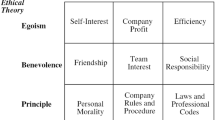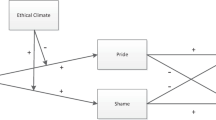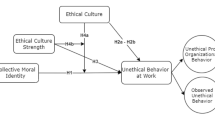Abstract
This study examined the relationship between unethical employee behavior and the dimensions of the Ethical Climate Questionnaire (ECQ). In order to explore the relationship between the dimensions of the ECQ and unethical behavior, the factor structure of five previously identified empirical models and the hypothesized nine-dimension model for the ECQ was tested with a confirmatory factor analysis. The analysis revealed that the hypothesized nine-dimension model provided as good or even better fit to the data than the five empirically derived models. Therefore, the nine-dimensional model was used to examine the criterion-related validity of the ECQ. The results demonstrated that the nine ethical climate dimensions were correlated with some of the unethical behaviors examined in this study, but not others. However, the results clearly demonstrated that most of the ethical climate dimensions were significantly related to an aggregate measure of unethical behavior. It was suggested that these results might account for the differences in previous studies on the criterion-related validity of the ECQ. The results also replicated a previous report that the association between unethical behavior and ethical climate is stronger in organizations that do not have a code of ethics. Finally, a difference was observed in the ethical climates for organizations with a code of ethics and organizations without a code of ethics.
Similar content being viewed by others
References
Agarwal, J. and D. C. Malloy: 1999, ‘Ethical Work Climate Dimensions in a Not-for-Profit Organization: An Empirical Study’, Journal of Business Ethics 20, 1–14.
Akaah, I. P.: 1992, ‘Social Inclusion as a Marketing Ethics Correlate’, Journal of Business Ethics 11, 599–608.
Bagozzi, R. P.: 1980, Causal Modeling in Marketing (Wiley & Sons, New York, NY).
Bennett, R. J. and S. L. Robinson: 2000, ‘Development of a Measure of Workplace Deviance’, Journal of Applied Psychology 85, 349–360.
Bollen, K.: 1989, Structural Equations with Latent Variables (Wiley & Sons, New York, NY).
Brown, F. G.: 1983, Principles of Educational and Psychological Testing (Holt, Rinehart, and Winston, New York, NY).
Campbell, D. T. and D. W. Fiske: 1959, ‘Convergent and Discriminate Validation by the Multitrait-Method Matrix’, Psychological Bulletin 56, 81–105.
Cullen, J. B., B. Victor and J. W. Bronson: 1993, ‘The Ethical Climate Questionnaire: An Assessment of Its Development and Validity’, Psychological Reports 73, 667–674.
Cullen, J. B., B. Victor and C. Stephens: 1989, ‘An Ethical Weather Report: Assessing the Organization's Ethical Climate’, Organizational Dynamics 18, 50–62.
Deshpande, S. P.: 1996, ‘Ethical Climate and the Link between Success and Ethical Behavior: An Empirical Investigation of a Non-Profit Organization’, Journal of Business Ethics 15, 315–320.
Deshpande, S. P., E. George and J. Joseph: 2000, ‘Ethical Climates and Managerial Success in Russian Organizations’, Journal of Business Ethics 23, 211–217.
DeVellis, R. F.: 1991, Scale Development: Theories and Applications (Sage Publications, Thousand Oaks, CA).
Doll, W. J. and W. Xia: 1997, ‘Confirmatory Factor Analysis of the End-User Computing Satisfaction Instrument: A Replication’, Journal of End User Computing 9, 24–30.
Doll, W. J., W. Xia and G. Torkzadeh: 1994, ‘A Confirmatory Factor Analysis of the End-User Computing Satisfaction Instrument’, MIS Quarterly 18, 453–460.
Fimbel, N. and J. S. Burstein: 1990, ‘Defining the Ethical Standards of the High-Technology Industry’, Journal of Business Ethics 9, 929–948.
Ford, R. C. and W. D. Richardson: 1994, ‘Ethical Decision Making: A Review of the Empirical Literature’, Journal of Business Ethics 13, 203–221.
Fritzsche, D. J.: 2000, ‘Ethical Climates and the Ethical Dimension of Decision-Making’, Journal of Business Ethics 24, 125–140.
Fritzsche, D. J. and H. Becker: 1984, ‘Linking Management Behavior to Ethical Philosophy’, Academy of Management Journal 27, 166–175.
Gorsuch, R. L.: 1983, Factor Analysis (Lawrence Earlbaum Associates, Hillsdale, NJ).
Heck, R. H.: 1998, ‘Factor Analysis: Exploratory and Confirmatory Approaches’, in: G. A. Marcoulides (ed.), Modern Methods for Business Research (Lawrence Erlbaum Associates, Mahawah, NJ).
Hu, L. and P. M. Bentler: 1999, ‘Cutoff Criteria for Fit Indexes in Covariance Structure Analysis’, Structural Equation Modeling 6, 1–55.
Kelloway, E. K.: 1998, Using LISREL for Structure Equation Modeling (Sage Publications, Thousand Oaks, CA).
Kohlberg, L. K.: 1981, The Philosophy of Moral Development (Harper & Row, New York, NY).
Kotter, J. P. and J. L. Heskett: 1992, Corporate Culture and Performance (The Free Press, New York, NY).
Rushton, J. P., C. J. Brainerd and M. Pressley: 1983, ‘Behavioral Development and Construct Validity: The Principle of Aggregation’, Psychological Bulletin 94, 18–38.
Treviño, L. K., K. D. Butterfield and D. L. McCabe: 1988, ‘The Ethical Context in Organizations: Influences on Employee Attitudes and Behaviors’, Business Ethics Quarterly 8, 447–476.
Upchurch, R. S. and S. K. Ruhland: 1996, ‘The Organizational Bases of Ethical Work Climates in Lodging Operations as Perceived by General Managers’, Journal of Business Ethics 15, 1083–1093.
Vaicys, C., T. Barnett and G. Brown: 1996, ‘An Analysis of the Factor Structure of the Ethical Climate Questionnaire’, Psychological Reports 79, 115–120.
Victor, B. and J. B. Cullen: 1987, ‘A Theory and Measure of Ethical Climate in Organizations’, Research in Corporate Social Performance and Policy 9, 51–71.
Victor, B. and J. B. Cullen: 1988, ‘The Organizational Bases of Ethical Work Climates’, Administrative Sciences Quarterly 33, 101–125.
Vidaver-Cohen, D.: 1998, ‘Moral Climate in Business Firms: A Conceptual Framework for Analysis and Change’, Journal of Business Ethics 17, 1211–1226.
Weber, J.: 1995, ‘Influences Upon Organizational Ethical Subclimates: A Multi-Departmental Analysis of a Single Firm’, Organizational Science 6, 509–523.
Wimbush, J. C. and J. M. Shepard: 1994, ‘Toward an Understanding of Ethical Climate: Its Relationship to Ethical Behavior and Supervisory Influence’, Journal of Business Ethics 13, 637–647.
Wimbush, J. C., J. M. Shepard and S. J. Markham: 1997, ‘An Examination of the Relationship between Ethical Climate and Ethical Behavior from Multiple Levels of Analysis’, Journal of Business Ethics 16, 1705–1716.
Author information
Authors and Affiliations
Rights and permissions
About this article
Cite this article
Peterson, D.K. The Relationship between Unethical Behavior and the Dimensions of the Ethical Climate Questionnaire. Journal of Business Ethics 41, 313–326 (2002). https://doi.org/10.1023/A:1021243117958
Issue Date:
DOI: https://doi.org/10.1023/A:1021243117958




